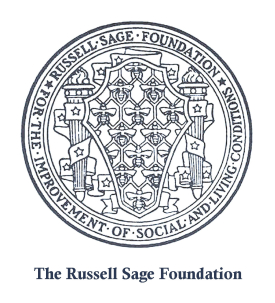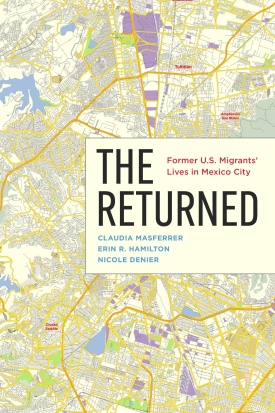“Written with a strong theoretical background and based in in-depth interviews, The Returned explores the complex and often contradictory experiences of return migration to Mexico. It reveals the mixed emotions of individuals who find themselves trapped between two worlds—one left behind with lost economic opportunities and the other not fully embraced. The authors illuminate the challenges and transformations that shape the lives of returnees, providing a nuanced perspective on the forces that drive and define migration within a complex policy framework.”
—MARÍA DOLORES PARÍS POMBO, profesora-investigadora, Departamento de Estudios Culturales, El Colegio de la Frontera Norte, Tijuana, B.C.
“The Returned makes an important contribution to research on migration, both by focusing on the less researched reality of return migration, which has grown dramatically in recent decades, and by illuminating the struggles returnees face—the sense of being norteado (‘disoriented’ is one translation) when they go to live in Mexico City. Claudia Masferrer, Erin R. Hamilton, and Nicole Denier expertly analyze the experience of deportees and de facto deportees (those who return to Mexico with a deported spouse or family member) and trace how return migration fits into the life course. An important book.”
—ROBERT COURTNEY SMITH, professor of sociology, CUNY Graduate Center and Baruch College
“The Returned tells the story of a historic turning point in which more Mexicans come back from the United States than emigrate. Lively interviews reveal how families cope with binational separation, finding work, and starting over in Mexico City. This is a highly readable contribution to understanding return migration.”
—DAVID FITZGERALD, Gildred Chair in U.S.-Mexican Relations and professor of sociology, University of California San Diego
In the first two decades of the 21st century, more than two million Mexican migrants returned to Mexico from the United States. Between 2010 and 2020, the number of people who returned to Mexico was so large that, for the first time in at least fifty years, more people entered Mexico from the United States than entered the United States from Mexico. Many of these migrants were destined for urban areas, and we know little about how they fare after they return to cities. In The Returned, sociologists Claudia Masferrer, Erin R. Hamilton, and Nicole Denier examine the experiences of returned migrants in Mexico City, one of the largest metropolitan areas in the world.
Masferrer, Hamilton, and Denier draw on interviews with former U.S. migrants living in Mexico City to better understand the experience of return migration to urban areas. Each of the migrants they spoke with lived in the United States for long periods with noncitizen status during the last four decades. During this time, U.S. immigration policy became increasingly focused on restriction and enforcement, which made it difficult for migrants to safely move back and forth across the border for work or to visit family without documentation. The authors find that upon their return, migrants in Mexico City felt disoriented and lost and had difficulty adapting to a massive urban environment where there is little support for returnees. They struggled to translate their work experience from their time in the U.S. to find quality jobs. Additionally, many found their family lives upended as they reunited with or formed families in the U.S.. Some found themselves separated from family members still in the U.S. with no ability to legally visit them. Others brought their families back to Mexico, some of whom were U.S. citizens and had never been to Mexico before. They, too, struggled to adapt and integrate to life in Mexico City.
The authors use the experiences of return migrants to discuss policies and practices that would improve their lives and ease their reintegration. To help with the disorientation they experience, returnees proposed ongoing psychological support with mental health professionals who have knowledge and training in the social and legal issues that return migrants face. Return migrants also advocated for policies to enhance skill matching, job creation, and entrepreneurship, as many felt the occupational skills they developed in the U.S. were undervalued in Mexico. To address family separation, returnees argued for legal and policy reform to accommodate family reunification.
The Returned is an illuminating account of the difficulties faced by return migrants and their families in Mexico City.
CLAUDIA MASFERRER is an associate professor, Centre for Demographic, Urban, and Environmental Studies, El Colegio de México
ERIN R. HAMILTON is a professor of sociology, University of California, Davis
NICOLE DENIER is an associate professor, Department of Sociology, University of Alberta


